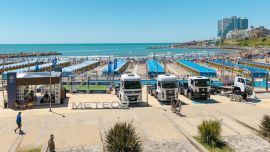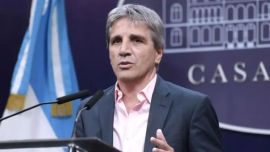Argentina is unable to repay its US$45-billion debt with the International Monetary Fund under current negotiating conditions, influential Vice-President Cristina Fernández de Kirchner said Wednesday, diminishing the possibility of an agreement with the country’s largest creditor.
“We can’t pay because we don’t have the money to pay,” the former president said at an event in Las Flores, Buenos Aires Province, adding that the terms and conditions are “unacceptable.”
Fernández de Kirchner’s comments come after discussions between Economy Minister Martín Guzmán and IMF Managing Director Kristalina Georgieva in Washington on Tuesday that what was described by both sides as a “very good meeting.”
The hardline stance from Fernández de Kirchner, who battled with holdout creditors during her eight years in office from 2007 to 2015, may help bury the already diminished prospects for a deal to get done before key midterm elections in October. President Alberto Fernández leads a broad Peronist coalition, and Fernández de Kirchner comes from a more radical but important left-wing group.
“Key players in the government’s coalition would prefer to be perpetually at war with the Fund,” Benjamin Gedan, director of the Argentina Project at the Wilson Center, a Washington-based think tank. “That attitude is not productive and complicates the economy minister’s efforts to negotiate a new programme.”
Spokesmen for the Presidency and the Economy Ministry didn’t respond to requests for comment.
Also on Wednesday, Argentina’s Foreign Ministry announced that the nation is formally leaving the Lima Group of Western hemisphere nations who seek a peaceful transition of power from Nicolás Maduro’s government in Venezuela. Moves to isolate Maduro’s government “haven’t led to anything,” and the inclusion of his Venezuelan opposition in the bloc has led to positions that Argentina can’t join, the Ministry said in a statement.
Uncertainty
Argentine dollar bonds maturing in 2030 fell 0.9 cents on the dollar to 34.15 cents on Wednesday. The bonds edged lower after Fernández de Kirchner’s comments. Argentina restructured US$65-billion of debt with private bondholders last year and is still trying to reschedule payments with the Washington-based lender.
The cost to protect against losses on Argentina’s debt jumped to the highest level since the country emerged from default last year. Credit-default swaps linked to the nation rose 1 percentage point to an upfront cost of 39 percentage points, according to ICE Data Services. That means it would cost US$3.9 million upfront to insure US$10 million of Argentina bonds.
An IMF spokesperson declined to comment on Fernández de Kirchner’s remarks.
In the speech, Fernández de Kirchner was flanked by Axel Kicillof, the governor of Buenos Aires Province and her son Máximo, who is a lawmaker. She called on the opposition to help seek better terms from the Fund since they are responsible for taking on the debt under former president Mauricio Macri.
“We are not saying to not pay the debt,” the former president emphasised. “Our political group was the only one that paid the debts of all the other governments. We should make an effort, the ruling party and the opposition, to give us a longer term and a different interest rate on a debt that others have contracted.”
Guzmán’s visit to Washington this week came after talks yielded little visible progress since they began last September, and after he met with investors in New York last Friday.
While IMF negotiators prefer to hash out a deal with Argentina as soon as possible to put the country back on a path to growth, the Fund knows it can’t force the nation’s hand, people familiar with the talks said earlier this month.
Officials in Buenos Aires already had been taming expectations on an agreement, with President Fernández recently saying he doesn’t want to rush talks. He has yet to send a detailed economic plan to the IMF or even top leaders within his coalition – a key step to move the negotiation forward.
Political calculus
The Peronist leader already faced a narrowing political path as the October 24 vote approaches. Announcing an agreement with the Fund, which is likely to include fiscal austerity pledges, could hurt the ruling coalition’s standing in a country where the IMF is usually blamed for its recurrent economic crisis.
Argentina faces an economic minefield. The country is just emerging from three years of recession, inflation is projected to hit nearly 50 percent this year and unemployment is in the double digits. The government’s US$65-billion debt restructuring with private creditors last year didn’t boost its credibility, and the bonds are now in junk territory again. The country has no access to foreign credit, forcing it to print money.
Now seeking its 22nd IMF programme since 1956, Argentina’s fraught history with the lender includes its 2001 financial crisis, when painful budget cuts urged by the Fund failed to avert an economic collapse and debt default. The record agreement in 2018, which failed to lift the economy, also translated into more austerity that led Argentines to vote out Macri’s pro-business government and elect Fernández.
“It’s not totally unexpected, this is an electoral year and she is delivering the message to their voting base, and we should expect more of the same from her,” said BBVA strategist William Snead in an interview from New York.
related news
by Juan Pablo Spinetto & Eric Martin, Bloomberg


























Comments